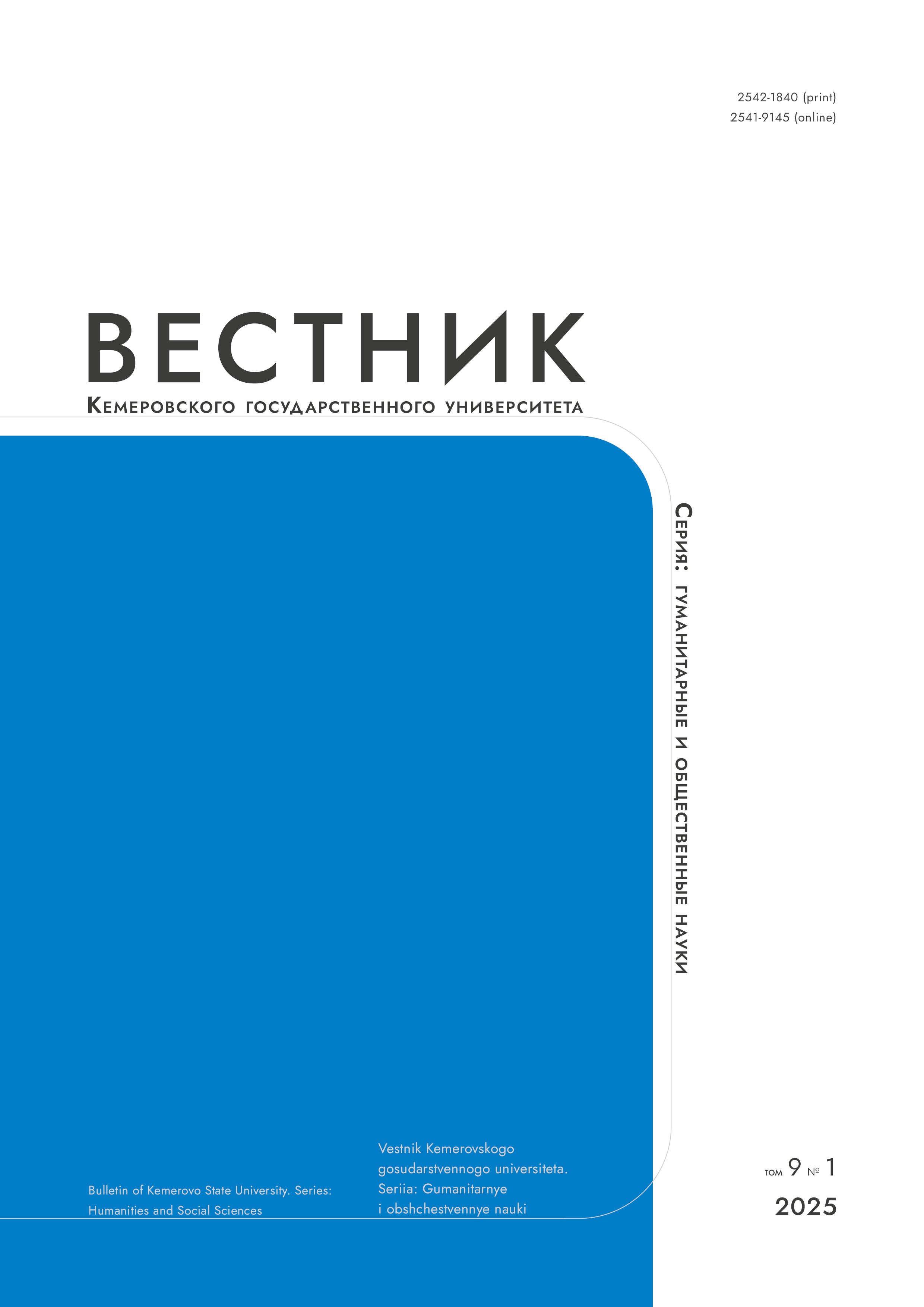Rostov-na-Donu, Rostov-on-Don, Russian Federation
Volgodonsk, Russian Federation
UDC 10
The paper features the term "lifeworld" coined in 1910 by E. Husserl. The research objective was to describe the ideological content of Husserl's phenomenology, which determined the content and categorical design (type) of phenomenological sociology. E. Husserl introduced a systematic concept of the "lifeworld" and used it as a basis for a branch of social science now referred to as "understanding sociology". In addition, Husserl’s socio-philosophical and epistemological research helped to resolve the "crisis" of science, which he himself discovered, and to recreate the trampled dignity of human subjectivity. The research generalizes and clarifies various scientific views on the criticism of E. Husserl's naturalism and the problem of "lifeworld". Its results can be used in courses of sociology, philosophy, and history.
phenomenological sociology, bourgeois social science, the world of everyday understanding, phenomenon, transcendental reduction, meaning
1. Husserl E. Husserliana. Bd. 6. Die Krisis der europaischen: Wissenschaften und die transzendentale Phanomenologie. Den Haag: Nijhoff, 1954, 273.
2. Dubovitskii V. V. Phenomenology of imagination of E. Husserl and J.-P. Sartre in the perspective of ontology and aesthetics. Filosofskaia mysl, 2015, (3): 112-150. (In Russ.) DOI: https://doi.org/10.7256/2409-8728.2015.3.14696
3. Shiyan A. A. Ontological and methodological principles of phenomenological approach of Edmund Husserl. Filosofiia. Zhurnal Vysshei shkoly ekonomiki, 2017, 1(3): 63-79. (In Russ.) DOI: https://doi.org/10.17323/2587-8719-2017-I-3-63-79
4. Blagovestnyi M. B. Influence of E. Husserl's phenomenology on the ontopsychological theory of A. Menegetti. Izvestiia Saratovskogo universiteta. Novaia seriia. Seriia: Filosofiia. Psikhologiia. Pedagogika, 2018, 18(1): 4-10. (In Russ.) DOI: https://doi.org/10.18500/1819-7671-2018-18-1-4-10
5. Gupta B. Advaita vedānta and Husserl's Phenomenology. Husserl Studies, 2004, 20(2): 119-134. DOI: https://doi.org/10.1023/B:HSTU.0000033051.31026.3a
6. Aldea A. S. Phenomenology as critique: Teleological-historical reflection and Husserl’s Transcendental Eidetics. Husserl Studies, 2016, 32(1): 21-46. DOI: https://doi.org/10.1007/s10743-016-9186-8
7. Hobbs D. J. Who Is the Subject of Phenomenology? Husserl and Fink on the Transcendental Ego. Journal of the British Society for Phenomenology, 2019, 50(2): 154-169. DOI:https://doi.org/10.1080/00071773.2018.1530135
8. Hannah B. Flesh and Body: The Phenomenology of Husserl. Journal of the British Society for Phenomenology, 2019, 50(3): 278-279. DOI: https://doi.org/10.1080/00071773.2018.1558791
9. Brand G. Die Lebenswelt. Eine Philosophie des konkreten Apriori. Berlin: Walter de Gruyter, 1971, 651.
10. Husserl E. Philosophy as a strict science. Logos, 1911, book 1, 1-56. (In Russ.)
11. Heffernan G. The Concept of Krisis in Husserl’s The Crisis of the European Sciences and Transcendental Phenomenology. Husserl Studies, 2017, 33(3): 229-257. DOI: https://doi.org/10.1007/s10743-017-9209-0
12. Taipale J. Peter R. Costello: Layers in Husserl’s Phenomenology. On Meaning and Intersubjectivity. Husserl Studies, 2015, 31(2): 169-173. DOI: https://doi.org/10.1007/s10743-014-9160-2
13. Rabanaque L. R. Saulius Geniusas: The Origins of the Horizon in Husserl’s Phenomenology. Husserl Studies, 2014, 30(2): 187-194. DOI: https://doi.org/10.1007/s10743-013-9145-6
14. Marx K., Engels F. From early works. Moscow: Politizdat, 1956, 690. (In Russ.)
15. Marx K., Engels F. Works, 2nd ed. Moscow: Politizdat, 1960, vol. 23, 920. (In Russ.)
16. Kozyreva A. S. Non-representational approaches to the unconscious in the phenomenology of Husserl and Merleau-Ponty. Phenomenology and the Cognitive Sciences, 2018, 17(1): 199-224. DOI: https://doi.org/10.1007/s11097-016-9492-9
17. Buckley P. Phenomenology as Soteriology: Husserl and the call for "Erneuerung" in the 1920s. Modern Theology, 2019, 35(1): 5-22. DOI: https://doi.org/10.1111/moth.12457
18. Sai Hang K. Sign and Hyle: Re-reading Derrida’s Critique of Husserl Through the Bernau Manuscripts. Journal of the British Society for Phenomenology, 2019, 50(3): 234-248. DOI: https://doi.org/10.1080/00071773.2019.1578027
19. Van Mazijk C. Husserl, impure intentionalism, and sensory awareness. Phenomenology and the Cognitive Sciences, 2019, 18(2): 333-351. DOI: https://doi.org/10.1007/s11097-018-9558-y
20. McDonnell C. The Origins of the Husserl-Heidegger Philosophical Dispute in Twentieth-Century Phenomenology. Maynooth Philosophical Papers, 2018, (9): 81-112. DOI: https://doi.org/10.5840/mpp201810305
21. Staehler T. The Possibility of a Phenomenology of Cultural Worlds in Hegel and Husserl. Hegel Bulletin, 2017, 38(1): 85-103. DOI: https://doi.org/10.1017/hgl.2016.68
22. Savin A. E. A Criticism of naturalism and transcendental turn in phenomenology (concept of epoch and reduction in Husserl’s Idea of phenomenology). Vox. Filososkii zhurnal, 2016, (21): 278-291. (In Russ.) DOI: https://doi.org/10.24411/2077-6608-2016-00019
23. Yampolskaya A. V. Phenomenological reduction as a philosophical conversion. Voprosy filosofii, 2012, (9): 157-166. (In Russ.)
24. Kakabadze Z. M. The problem of existential crisis and transcendental phenomenology of Edmund Husserl. Tbilisi: Metsniereba, 1966, 159. (In Russ.)
25. Toshchenko Zh. T. Life world and its meanings. Sotsiologicheskie issledovaniia, 2016, 1: 6-17. (In Russ.)
26. Toshchenko Zh. T. Lifeworld - methodological characteristics of sociology of life. Vestnik RGGU. Seriia: Filosofiia. Sotsiologiia. Iskusstvovedenie, 2015, 7: 9-14. (In Russ.)
27. Toshchenko Zh. T., Velikiy P. P. The key meanings of the lifeworld of rural residents in Russia. Mir Rossii. Sotsiologiia. Etnologiia, 2018, 27(1): 7-33. (In Russ.) DOI: https://doi.org/10.17323/1811-038X-2018-27-1-7-33
28. Sociological mosaic-2018, ed. Dmitriev A. V., Ivanov V. N,. Toshchenko Zh. T. Moscow: KNORUS, 2018, 242. (In Russ.)
29. Toshchenko Zh. T. Senses as a quality and essential characteristic of the sociology of life (continued). Gumanitarii Iuga Rossii, 2017, 6(6): 67-77. (In Russ.) DOI: https://doi.org/10.23683/2227-8656.2017.6.4
30. Toshchenko Zh. T. Sociology of life. Moscow: Unity-Dana, 2016, 399. (In Russ.)
31. Divisenko K. S. The lifeworld researches in social sciences. Sotsiologicheskii zhurnal, 2014, (1): 6-20. (In Russ.) DOI: https://doi.org/10.19181/socjour.2014.1.479
32. Marx K., Engels F. Works, 2nds ed. Moscow: Politizdat, 1961, vol. 19, 703. (In Russ.)
33. Olkhovikov K. M., Olkhovikova S. V. The human lifeworld: Searching for the archaic or rehabilitating the quotidian? Teoriia i praktika obshchestvennogo razvitiia, 2017, (4): 10-13. (In Russ.) DOI: https://doi.org/10.24158/tipor.2017.4.1
34. Chernavin G. I. The "plexus" of phenomenological work and the fundamental act of philosophy. Logos, 2016, 26(1): 68-73. (In Russ.)





















